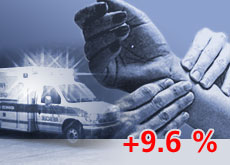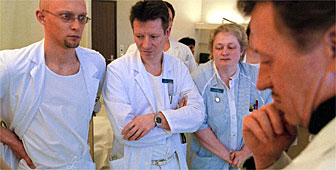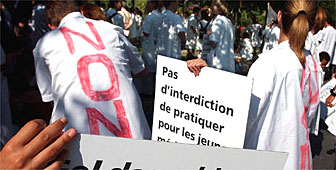Doctors warn of future shortage

Switzerland could be faced with a shortage of doctors in the near future.
Junior doctors are warning that a drop in medical students and a scarcity of doctors in other European countries will have telling consequences on the profession in Switzerland.
The Bern branch of Switzerland’s Junior Doctors Association has launched a campaign to increase public awareness of an issue that it maintains could become a major problem as early as five years from now.
“At the moment there’s not a shortage but there very soon could be,” Oliver Adam, vice president of the association, told swissinfo.
“Many hospitals in Switzerland are having difficulty filling vacancies and there are fewer people studying to become doctors.”
Foreign doctors
Part of the solution until now has been to recruit from abroad. Around 30 per cent of hospital doctors in Switzerland are foreigners – many of them from Germany.
But Adam says many European countries are now facing their own shortage of qualified doctors. He says in Germany around 2,000 hospital positions remain unfilled and the official reduction in the length of the working week there will create even more vacancies.
“Recruiting European doctors would be a possibility if there were enough doctors in the EU,” he said. “But Germany, France and Britain are all facing their own shortages.
“They are all looking abroad to hire doctors, and Britain has even launched a campaign in the Swiss medical press to help solve the situation.”
Medical students
Another indication of a potential problem, according to Adam, is the recent fall in the number of people entering medicine.
In 1998 there were almost 8,000 medical students in Switzerland, but the level dropped last year to just over 7,000.
“There is a lack of students entering the profession and many fail to complete their studies or choose an alternative career once they have qualified,” he says.
“In any case there are clear signs that there aren’t enough new doctors coming out of university to replace those who will be retiring.”
Adam says that although the proportion of women entering the profession has increased to reach more than 50 per cent for the first time, this will also lead to extra pressure being put on the system.
He maintains that not only will there be fewer qualified doctors, but more of them will be looking for part-time work.
Healthcare costs
The launch of the campaign comes as parliament is looking for ways to cut Switzerland’s spiralling health care costs – among the most expensive in the world.
According to 1998 figures from the Organisation of Economic Cooperation and Development, health costs in Switzerland account for 10.4 per cent of the country’s Gross Domestic Product (GDP).
That puts Switzerland in second place behind the United States with 12.9 per cent of GDP.
In July last year the government imposed a controversial three-year moratorium on new doctors’ practices in a bid to reduce health costs.
There are currently over 25,000 doctors registered in Switzerland – giving the country one of the highest number of doctors per head of the population in Europe. Around 14,000 are general practitioners or specialists and 11,000 are hospital doctors.
swissinfo, Jonathan Summerton
There are over 25,000 doctors registered in Switzerland – around 14,000 are general practitioners or specialists and 11,000 are hospital doctors.
Around 30 per cent of hospital doctors in Switzerland are recruited from abroad.
The number of medical students has dropped by almost 1,000 in the last four years.
Health costs in Switzerland account for 10.4 per cent of the country’s Gross Domestic Product.

In compliance with the JTI standards
More: SWI swissinfo.ch certified by the Journalism Trust Initiative











You can find an overview of ongoing debates with our journalists here . Please join us!
If you want to start a conversation about a topic raised in this article or want to report factual errors, email us at english@swissinfo.ch.